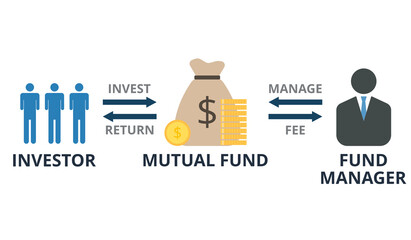- Published on
All things you need to know about Mutual funds
- Authors

- Name
- Money Matra
- @praphulbhatt19
What are Mutual funds? Explained in simple terms.

If you're new to the world of investing, mutual funds can seem like a complex concept. But fear not, because we're here to break it down for you in simple terms.Imagine you and a group of friends decide to pool your money together to buy stocks, bonds, or other assets. Each of you owns a portion of the investments based on how much money you contributed. This collective investment approach is essentially what a mutual fund is all about.
looking a little bit complicated Alright, here's the mutual fund concept explained in a way even your uncle who just learned how to use Whatsapp can understand:
Imagine a Thela (Street Vendor) with many Samosas!
Sharing the Basket: You and a bunch of people all want some delicious samosas from your favorite thela (vendor). But none of you have enough money for a whole plate by yourself. So, everyone puts in a little bit of their money together, like creating a big basket of cash. This big basket is like a mutual fund.
The Samosa Master: The thelewala (vendor) is like the fund manager. He's the expert who knows exactly what kind of samosas to buy (like different stocks) to make a tasty profit (earn money for everyone).
Variety is the Spice of Life!: Instead of buying just potato samosas (like investing in just one company), the thelewala gets a variety of fillings - aloo (potato), paneer (cheese), and maybe even some singara (sweet pastries) for good measure (diversification). This way, even if people don't like aloo samosas as much this week, the other flavors will still sell well (reduces risk).
Sharing the Profits: At the end of the day, if the samosas sell out and the thelewala makes a good profit, he splits the money amongst everyone who contributed to the basket (investors). Everyone wins!
Now the actual question is How it works?

Suppose you approach a mutual fund company (Asset Management Company or AMC) or invest through an online platform like Grow,Zerodha and many others.Now you choose a specific mutual fund scheme based on your investment goals and risk tolerance.There are different types of funds like equity funds (focus on stocks), debt funds (focus on bonds), and balanced funds (mix of stocks and bonds).
You invest a certain amount of money. This can be a lump sum amount or a smaller amount invested regularly (Systematic Investment Plan or SIP). The money you and other investors contribute goes into a large pool than The fund manager who is an expert in the financial markets uses your combined money to invest in various financial instruments like stocks, bonds, and other assets as per the scheme's objective. The fund manager continuously monitors the investments and makes adjustments as needed to optimize returns.
The value of the mutual fund keeps changing based on the performance of the underlying investments (stocks, bonds, etc.)
So, mutual funds earn returns by:
- Ingredients getting more valuable (capital appreciation): When the price of the underlying investments (stocks, bonds) goes up.
- Sharing the success (dividends): When companies in the fund pay out a portion of their profits.
Redemption:
- You can redeem your investment (sell your units) at any time (except for close-ended funds that have a lock-in period).
- The redemption price is based on the NAV at that time.
- You will receive the redemption amount minus any applicable exit load (a fee charged by some funds if you redeem your units within a short period).
Ok now lets take this last Example
- Let's say you invest Rs. 10,000 in a mutual fund scheme, and you receive 10 units (as the NAV is Rs. 1,000 per unit).
- After a year, the NAV increases to Rs. 1,200 due to good performance of the underlying investments.
- If you redeem your 10 units at this point, you will receive Rs. 12,000 (10 units * Rs. 1,200 NAV). This represents a profit of Rs. 2,000 on your investment.
Do Mutual funds offer better returns than Fixed deposits (FDs)?
Answer is Yes, mutual funds have the potential to offer higher returns than fixed deposits (FDs) but come with greater risk. Here's a simple way to think about it:
Think of FD as a safe piggy bank: It grows slowly but steadily at a predictable rate.
Think of a mutual fund as a stock market adventure: It has the potential for higher returns but also comes with the risk of a bumpy ride.
Key Points to Remember:
Mutual funds are not risk-free. The returns depend on the performance of the underlying investment.
Past performance is not necessarily indicative of future results
Choose a mutual fund that aligns with your investment goals and risk tolerance.
Consider a long-term investment horizon for better potential returns.
Don't invest money you can't afford to lose.
Remember: This is not financial advice. Talk to someone who knows more, like a bank or financial advisor, before investing. But hopefully, this gives you a basic idea of how mutual funds work! Now you can be a samosa-loving expert on how to grow your money!